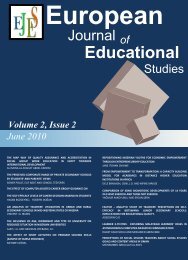How Libraries Contribute to Communities and Society - Ozean ...
How Libraries Contribute to Communities and Society - Ozean ...
How Libraries Contribute to Communities and Society - Ozean ...
Create successful ePaper yourself
Turn your PDF publications into a flip-book with our unique Google optimized e-Paper software.
Moreover, libraries are now going online in droves. According <strong>to</strong> Ber<strong>to</strong>t(1998), approximately 72 percent of public<br />
libraries in the United States have some type of internet connection. Many patrons now go <strong>to</strong> those libraries solely<br />
for internet access. Therefore, in order <strong>to</strong> attract <strong>and</strong> retain such new patrons, libraries must provide a range of<br />
services that go along with internet access. The most important of these services is training. Ongoing support <strong>and</strong><br />
training are essential. This training is necessary not only for patrons but also for staff. Due <strong>to</strong> increasing prevalence<br />
<strong>and</strong> popularity of information technologies libraries must train both old <strong>and</strong> newly hired staff (Holl<strong>and</strong> 1999).<br />
At Joseph Ayo Babalola University, Ikeji-Arakeji in Osun State of Nigeria, internet access always draws different<br />
categories of users from all over the university <strong>to</strong> the e-Library <strong>to</strong> do one thing or the other. The users include<br />
faculty members, administrative staff members, technical staff members <strong>and</strong> messengers. Staff <strong>and</strong> students use the<br />
resources on the internet <strong>to</strong> do their assignment <strong>and</strong> research. It is a common sight <strong>to</strong> see this category of users in the<br />
e-library with their lap<strong>to</strong>ps <strong>to</strong> download information from the internet. Technicians, clerks, <strong>and</strong> messengers who do<br />
not normally use the resources of other sections of the library such as reference <strong>and</strong> circulation sections meet at the<br />
e-library <strong>to</strong> send <strong>and</strong> receive messages from their friends <strong>and</strong> relatives at home <strong>and</strong> abroad via the e-mail. Others<br />
come <strong>to</strong> read newspapers electronically. This is apart from the physical newspapers like The Guardian <strong>and</strong> Nigerian<br />
Tribune which also normally attract different categories of users <strong>to</strong> the library on a daily basis since the year 2006<br />
when the University was established. This is how the library serves as a unifying fac<strong>to</strong>r in the community.<br />
Special Services <strong>to</strong> the Disadvantaged<br />
In order <strong>to</strong> serve all segments of the community, the library must also pay attention <strong>to</strong> the disadvantaged members of<br />
the society. Many categories of people fall within this group. But for the purpose of this paper we shall concentrate<br />
on the sick in hospital, inmates of penal institutions, the aged <strong>and</strong> the physically h<strong>and</strong>icapped.<br />
It is true that the library cannot directly res<strong>to</strong>re good health <strong>to</strong> the sick or bring about the release of a prisoner or<br />
res<strong>to</strong>re youth <strong>to</strong> the old, nevertheless there are other ways the library can help these people. There is no doubt that<br />
reading can make time fly faster than lying down hours on end in the hospital bed doing nothing. Some long-term<br />
patients may be interested in serious reading for the first time while they are in the hospital because they have more<br />
leisure hours than they had before being hospitalized. If they have an opportunity <strong>to</strong> read, they will appreciate<br />
library services <strong>and</strong> may continue <strong>to</strong> use the library when they recover. Moreover, some patients might have been<br />
regular library users before they were admitted in<strong>to</strong> the hospital. This category of patients should not be denied<br />
library services because they are now in the hospital. By extending its services <strong>to</strong> the hospitaliszed, a library like the<br />
Hezekiah Oluwasanmi Library Annex at Obafemi Awolowo University Teaching Complex in Ile-Ife will enable<br />
non-users of the library <strong>to</strong> become aware of the existence of a library that has many books on many subjects. A<br />
library assistant in that library can take a trolley of books <strong>to</strong> different wards in the hospital at regular intervals <strong>to</strong><br />
cater for the patients.<br />
Nowadays, the inmates of many prisons include not only illiterates <strong>and</strong> semi-literates but also highly educated<br />
people. Some well-educated <strong>and</strong> notable scholars, who found their way in<strong>to</strong> prisons for one reason or the other,<br />
wrote interesting <strong>and</strong> fast-selling books when they were in prison. A glaring example is Nigeria’s Nobel laureate,<br />
Wole Soyinka, who wrote The Man Died, when he was in prison. Prison inmates should, therefore, be provided with<br />
library services like other members of the society. Those who have imbibed the reading culture before incarceration<br />
should be given ample opportunity <strong>to</strong> continue <strong>to</strong> read. Those who have not formed the reading habit before<br />
imprisonment should be taught <strong>to</strong> acquire the culture of literacy. This will greatly help in reforming, rehabilitating<br />
<strong>and</strong> reintegrating them in<strong>to</strong> the society after their discharge from prison.<br />
Until recently, most of the prisons <strong>and</strong> correctional institutions for the young in Nigeria have no libraries of their<br />
own. <strong>How</strong>ever, his<strong>to</strong>ry was made in the welfare package of prison inmates in Nigeria on 25 th May, 2001. On that<br />
day, the first ultra modern reading room <strong>and</strong> literacy centre for prison inmates was commissioned at the Ilesa Prison.<br />
The literacy centre is equipped with the state of the art books <strong>and</strong> computer hardware <strong>and</strong> software <strong>to</strong> enable the<br />
inmates <strong>to</strong> benefit from the literacy empowerment goal of the Non Governmental Organization that set up the centre.<br />
The reading room <strong>and</strong> literacy centre was named after Heinrich Boll who was one time a prisoner. The s<strong>to</strong>ry of<br />
Heinrich Boll has shown that incarceration cannot hinder an individual from actualizing his / her goals in life.<br />
Although Boll suffered incarceration, in 1978, he won the Nobel Prize for literature. This shows that <strong>to</strong> any inmate,<br />
the sky is the limit, if the individual so desires. The reading room in Ilesa was set up <strong>to</strong> enhance the self esteem of<br />
202

















